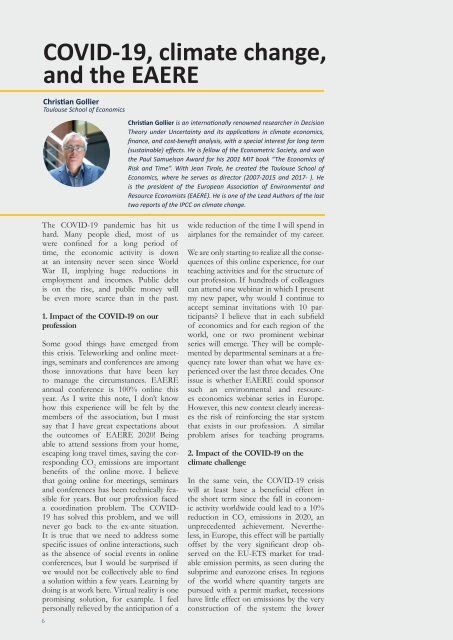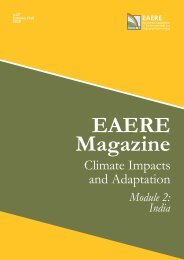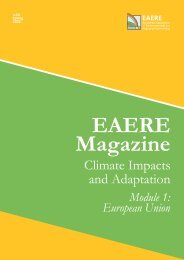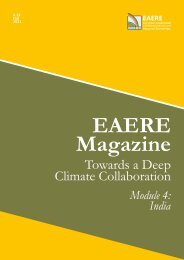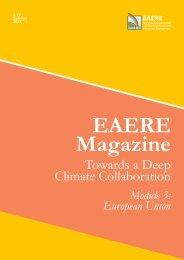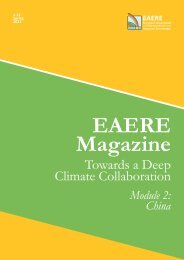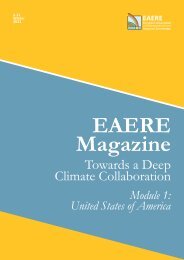You also want an ePaper? Increase the reach of your titles
YUMPU automatically turns print PDFs into web optimized ePapers that Google loves.
COVID-19, climate change,<br />
and the <strong>EAERE</strong><br />
Christian Gollier<br />
Toulouse School of Economics<br />
Christian Gollier is an internationally renowned researcher in Decision<br />
Theory under Uncertainty and its applications in climate economics,<br />
finance, and cost-benefit analysis, with a special interest for long term<br />
(sustainable) effects. He is fellow of the Econometric Society, and won<br />
the Paul Samuelson Award for his 2001 MIT book “The Economics of<br />
Risk and Time”. With Jean Tirole, he created the Toulouse School of<br />
Economics, where he serves as director (2007-2015 and 2017- ). He<br />
is the president of the European Association of Environmental and<br />
Resource Economists (<strong>EAERE</strong>). He is one of the Lead Authors of the last<br />
two reports of the IPCC on climate change.<br />
The COVID-19 pandemic has hit us<br />
hard. Many people died, most of us<br />
were confined for a long period of<br />
time, the economic activity is down<br />
at an intensity never seen since World<br />
War II, implying huge reductions in<br />
employment and incomes. Public debt<br />
is on the rise, and public money will<br />
be even more scarce than in the past.<br />
1. Impact of the COVID-19 on our<br />
profession<br />
Some good things have emerged from<br />
this crisis. Teleworking and online meetings,<br />
seminars and conferences are among<br />
those innovations that have been key<br />
to manage the circumstances. <strong>EAERE</strong><br />
annual conference is 100% online this<br />
year. As I write this note, I don’t know<br />
how this experience will be felt by the<br />
members of the association, but I must<br />
say that I have great expectations about<br />
the outcomes of <strong>EAERE</strong> <strong>2020</strong>! Being<br />
able to attend sessions from your home,<br />
escaping long travel times, saving the corresponding<br />
CO 2<br />
emissions are important<br />
benefits of the online move. I believe<br />
that going online for meetings, seminars<br />
and conferences has been technically feasible<br />
for years. But our profession faced<br />
a coordination problem. The COVID-<br />
19 has solved this problem, and we will<br />
never go back to the ex-ante situation.<br />
It is true that we need to address some<br />
specific issues of online interactions, such<br />
as the absence of social events in online<br />
conferences, but I would be surprised if<br />
we would not be collectively able to find<br />
a solution within a few years. Learning by<br />
doing is at work here. Virtual reality is one<br />
promising solution, for example. I feel<br />
personally relieved by the anticipation of a<br />
6<br />
wide reduction of the time I will spend in<br />
airplanes for the remainder of my career.<br />
We are only starting to realize all the consequences<br />
of this online experience, for our<br />
teaching activities and for the structure of<br />
our profession. If hundreds of colleagues<br />
can attend one webinar in which I present<br />
my new paper, why would I continue to<br />
accept seminar invitations with 10 participants?<br />
I believe that in each subfield<br />
of economics and for each region of the<br />
world, one or two prominent webinar<br />
series will emerge. They will be complemented<br />
by departmental seminars at a frequency<br />
rate lower than what we have experienced<br />
over the last three decades. One<br />
issue is whether <strong>EAERE</strong> could sponsor<br />
such an environmental and resources<br />
economics webinar series in Europe.<br />
However, this new context clearly increases<br />
the risk of reinforcing the star system<br />
that exists in our profession. A similar<br />
problem arises for teaching programs.<br />
2. Impact of the COVID-19 on the<br />
climate challenge<br />
In the same vein, the COVID-19 crisis<br />
will at least have a beneficial effect in<br />
the short term since the fall in economic<br />
activity worldwide could lead to a 10%<br />
reduction in CO 2<br />
emissions in <strong>2020</strong>, an<br />
unprecedented achievement. Nevertheless,<br />
in Europe, this effect will be partially<br />
offset by the very significant drop observed<br />
on the EU-ETS market for tradable<br />
emission permits, as seen during the<br />
subprime and eurozone crises. In regions<br />
of the world where quantity targets are<br />
pursued with a permit market, recessions<br />
have little effect on emissions by the very<br />
construction of the system: the lower<br />
6


